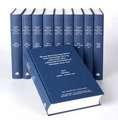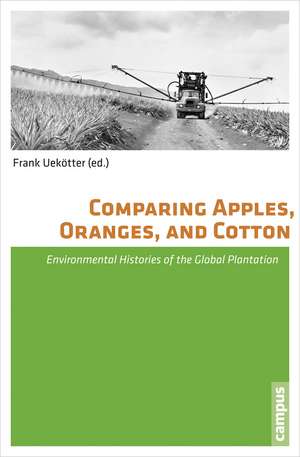Comparing Apples, Oranges, and Cotton – Environmental Histories of the Global Plantation: Emersion: Emergent Village resources for communities of faith
Autor Frank Uekötteren Limba Engleză Paperback – 10 noi 2014
Worldwide, plantations are key economic institutions of the modern era. From an environmental perspective, they are also the settings for some of the most powerful, consequential, and frequently destructive modes of production ever to have existed. This volume assembles essays on commodities as diverse as coffee, cotton, rubber, apples, oranges, and tobacco, to provide an overview of plantation systems from Latin America to New Zealand that exposes the many dimensions of environmental history incorporated in these robust institutions. The global history of plantation systems not only highlights the great institutional resilience of our modern monocultures, but also the price that humans and environments have paid for them.
Din seria Emersion: Emergent Village resources for communities of faith
-
 Preț: 144.99 lei
Preț: 144.99 lei - 9%
 Preț: 352.50 lei
Preț: 352.50 lei -
 Preț: 307.55 lei
Preț: 307.55 lei -
 Preț: 146.50 lei
Preț: 146.50 lei - 8%
 Preț: 360.28 lei
Preț: 360.28 lei -
 Preț: 185.37 lei
Preț: 185.37 lei -
 Preț: 183.89 lei
Preț: 183.89 lei -
 Preț: 115.53 lei
Preț: 115.53 lei - 6%
 Preț: 324.95 lei
Preț: 324.95 lei - 8%
 Preț: 346.31 lei
Preț: 346.31 lei -
 Preț: 67.35 lei
Preț: 67.35 lei -
 Preț: 101.43 lei
Preț: 101.43 lei -
 Preț: 216.90 lei
Preț: 216.90 lei - 18%
 Preț: 2261.34 lei
Preț: 2261.34 lei -
 Preț: 215.52 lei
Preț: 215.52 lei -
 Preț: 167.85 lei
Preț: 167.85 lei -
 Preț: 179.04 lei
Preț: 179.04 lei - 12%
 Preț: 290.56 lei
Preț: 290.56 lei -
 Preț: 156.84 lei
Preț: 156.84 lei - 9%
 Preț: 353.24 lei
Preț: 353.24 lei -
 Preț: 186.09 lei
Preț: 186.09 lei -
 Preț: 176.49 lei
Preț: 176.49 lei -
 Preț: 133.99 lei
Preț: 133.99 lei -
 Preț: 144.80 lei
Preț: 144.80 lei - 18%
 Preț: 348.59 lei
Preț: 348.59 lei -
 Preț: 138.26 lei
Preț: 138.26 lei -
 Preț: 163.52 lei
Preț: 163.52 lei - 18%
 Preț: 502.35 lei
Preț: 502.35 lei -
 Preț: 182.98 lei
Preț: 182.98 lei -
 Preț: 208.55 lei
Preț: 208.55 lei -
 Preț: 279.55 lei
Preț: 279.55 lei - 8%
 Preț: 563.24 lei
Preț: 563.24 lei -
 Preț: 116.07 lei
Preț: 116.07 lei -
 Preț: 120.81 lei
Preț: 120.81 lei -
 Preț: 160.63 lei
Preț: 160.63 lei - 9%
 Preț: 352.77 lei
Preț: 352.77 lei -
 Preț: 106.35 lei
Preț: 106.35 lei -
 Preț: 273.93 lei
Preț: 273.93 lei -
 Preț: 316.40 lei
Preț: 316.40 lei -
 Preț: 548.71 lei
Preț: 548.71 lei -
 Preț: 138.81 lei
Preț: 138.81 lei -
 Preț: 152.25 lei
Preț: 152.25 lei -
 Preț: 229.92 lei
Preț: 229.92 lei -
 Preț: 94.22 lei
Preț: 94.22 lei -
 Preț: 203.53 lei
Preț: 203.53 lei -
 Preț: 145.41 lei
Preț: 145.41 lei - 8%
 Preț: 311.68 lei
Preț: 311.68 lei -
 Preț: 208.32 lei
Preț: 208.32 lei -
 Preț: 302.76 lei
Preț: 302.76 lei - 8%
 Preț: 565.01 lei
Preț: 565.01 lei
Preț: 239.00 lei
Preț vechi: 287.76 lei
-17% Nou
Puncte Express: 359
Preț estimativ în valută:
45.74€ • 49.66$ • 38.42£
45.74€ • 49.66$ • 38.42£
Carte indisponibilă temporar
Doresc să fiu notificat când acest titlu va fi disponibil:
Se trimite...
Preluare comenzi: 021 569.72.76
Specificații
ISBN-13: 9783593500287
ISBN-10: 3593500280
Pagini: 272
Ilustrații: Mit Abbildungen und Tabellen
Dimensiuni: 142 x 211 x 20 mm
Greutate: 0.35 kg
Editura: CAMPUS VERLAG
Seria Emersion: Emergent Village resources for communities of faith
ISBN-10: 3593500280
Pagini: 272
Ilustrații: Mit Abbildungen und Tabellen
Dimensiuni: 142 x 211 x 20 mm
Greutate: 0.35 kg
Editura: CAMPUS VERLAG
Seria Emersion: Emergent Village resources for communities of faith
Notă biografică
Frank Uekötter is a reader in environmental humanities at the University of Birmingham, UK. He is the author of many books, including, most recently, The Greenest Nation?: A New History of German Environmentalism.
Recenzii
“This collection covers a diversity of plantation crops, plantation systems, global locations, and time periods. It nevertheless coheres around the themes of environmental history and environmental factors within plantation history, thus contributing both to plantation studies and environmental history. . . . The volume reinforces the tradition of scholarship that recognizes the plantation as one of the economic and institutional foundations of the modern world, but also adds a dimension of environmental history and context and supplies material for comparison and synthesis. . . . Recommended.”
